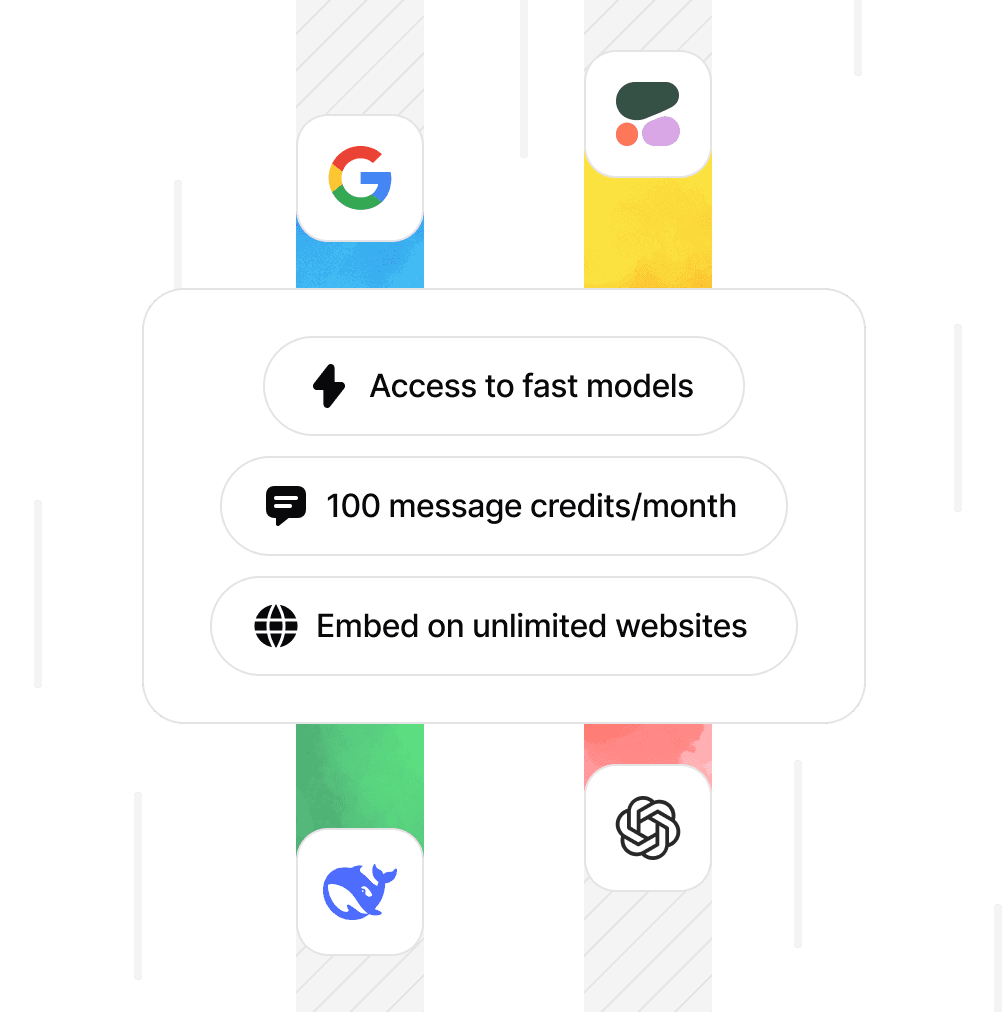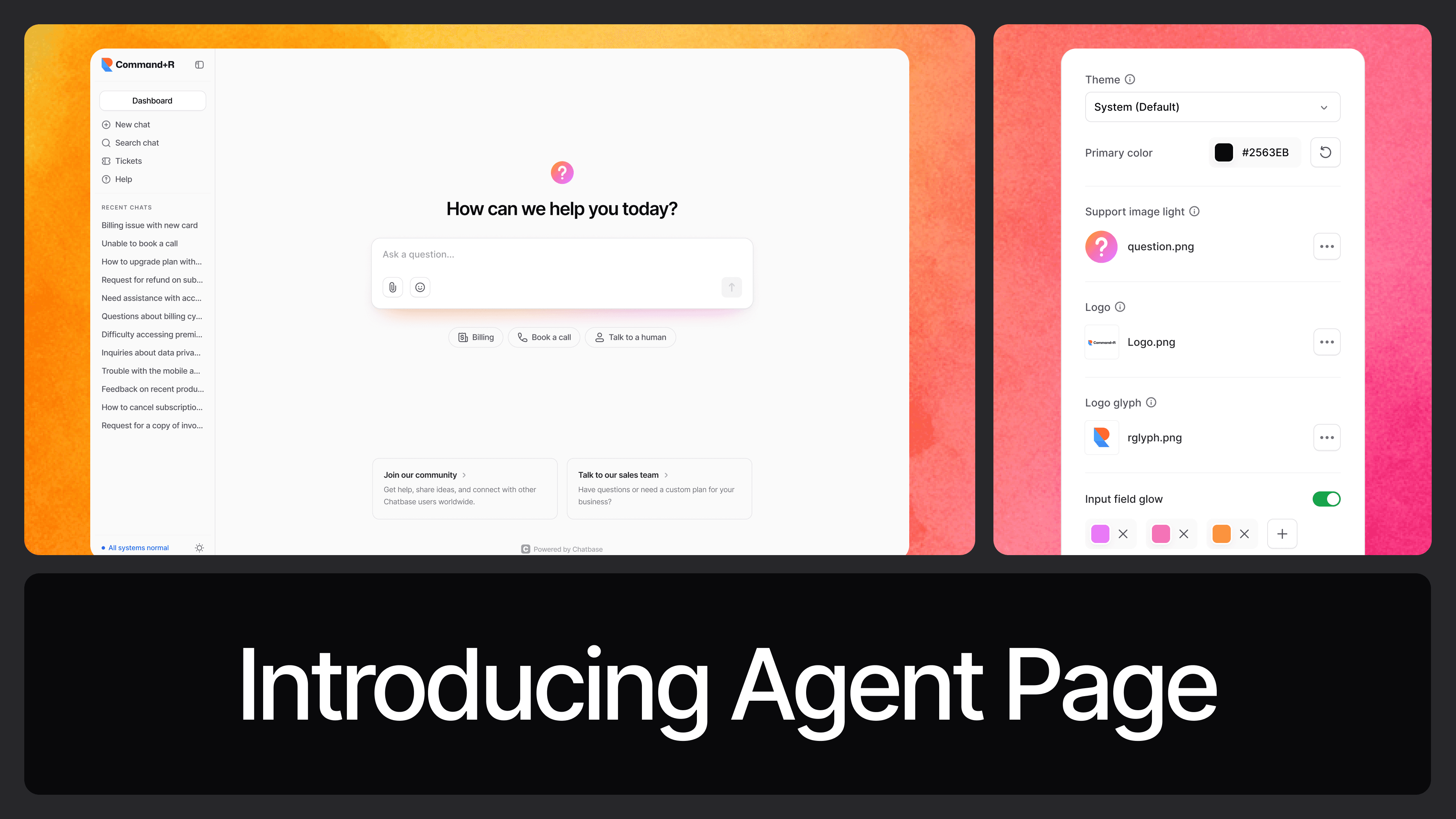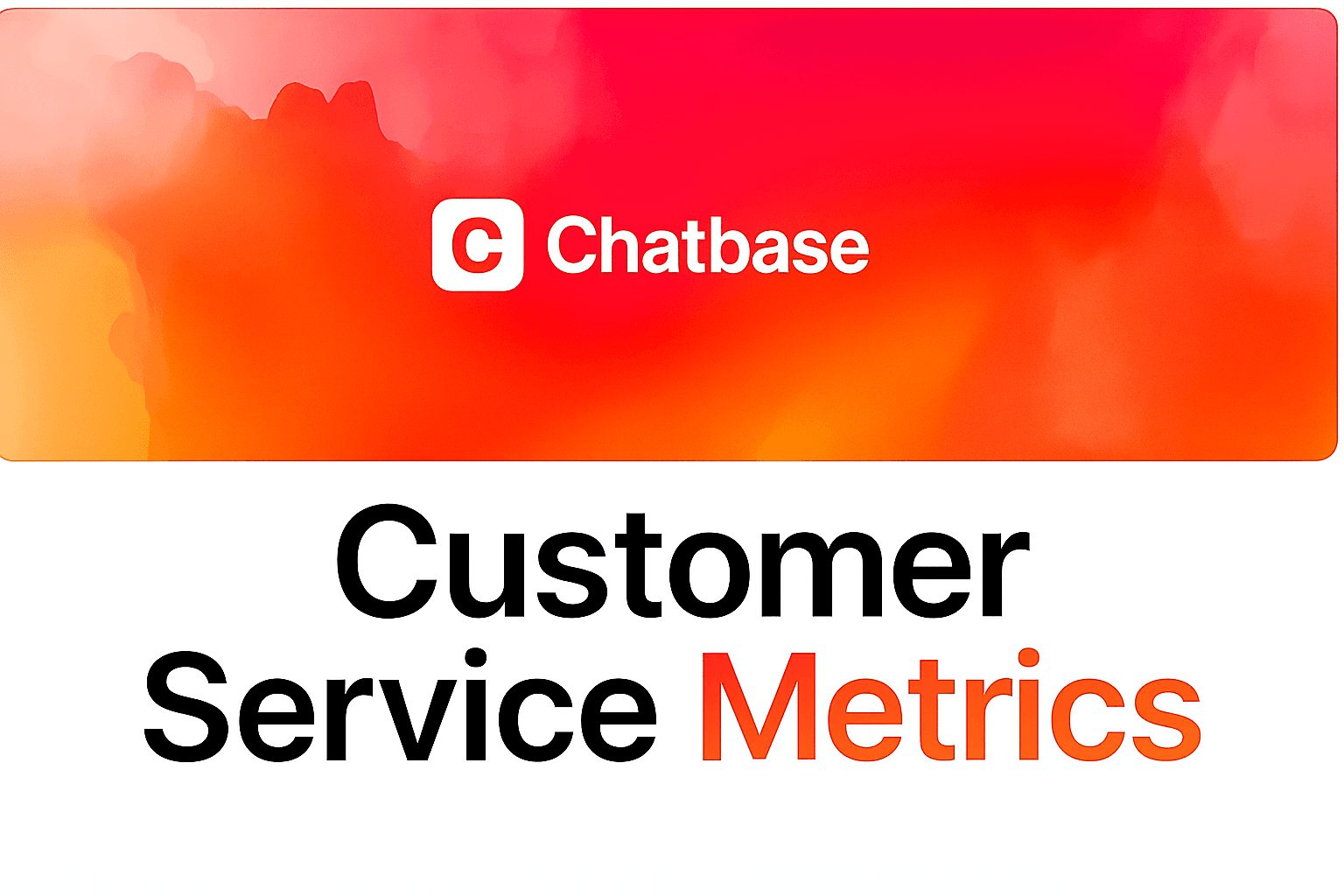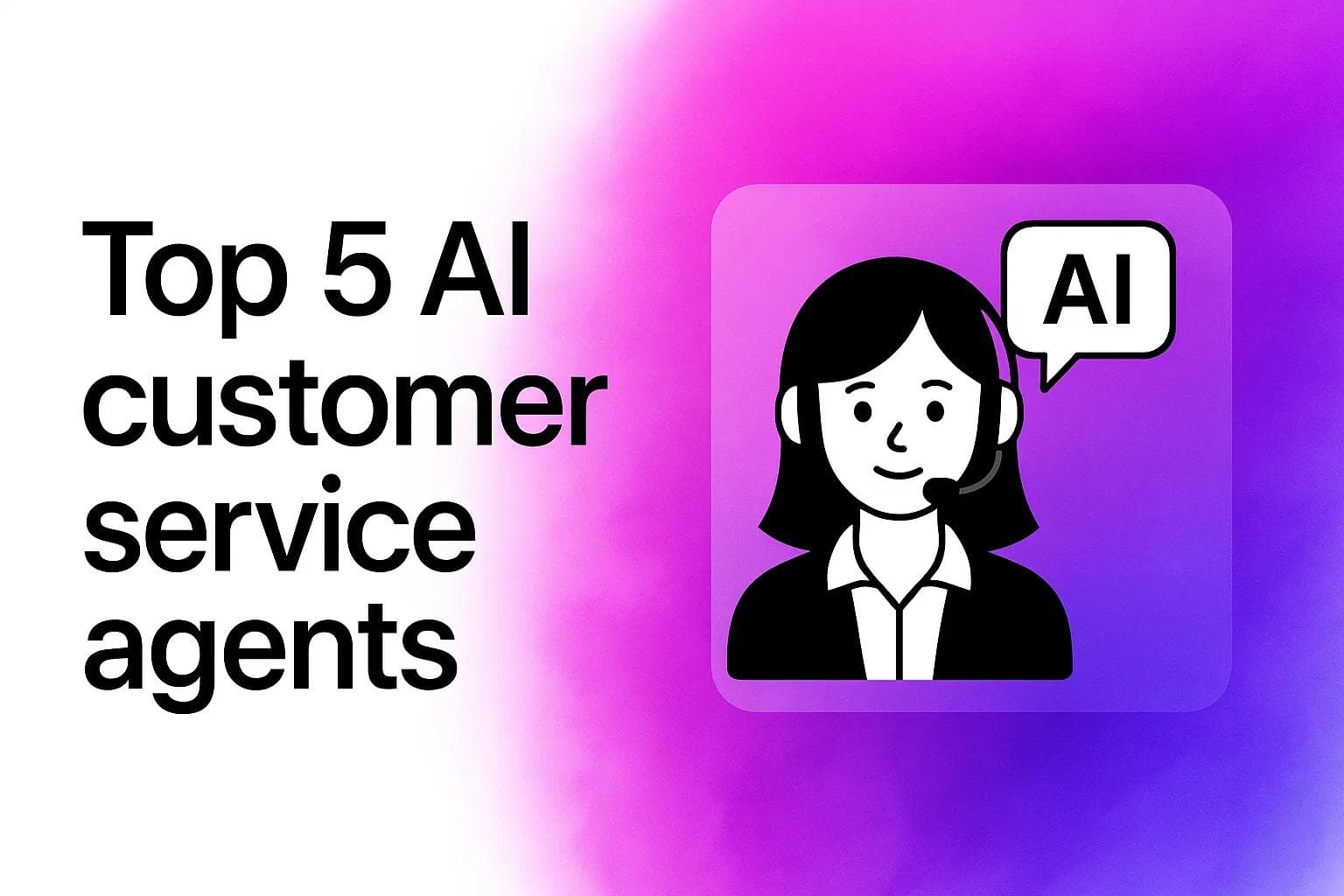10 Ways AI Will Transform Business in 2025
Ilias Ism
Sep 16, 2024
10 min read

Artificial intelligence (AI) is revolutionizing businesses. By 2024, AI integration will become a must for gaining a competitive edge.
This article reveals 10 ways AI can unlock growth, efficiency, and innovation.
Discover how leading companies like Chatbase use AI to elevate customer experience.
And how your business can benefit from tailoring AI solutions across operations.
You'll learn:
- How AI is creating new business models and revenue streams
- Which AI capabilities can boost productivity over 50%
- What AI-driven personalization can do for customer lifetime value
- How AI is transforming marketing, sales and business development
- How AI can mitigate risks and uncover growth opportunities
- Real-world examples of AI transformation from industry leaders
Join us as we explore the AI capabilities that will drive business success in the coming years.
1. Customer Experience
In 2024, AI will play a pivotal role in revolutionizing customer experience across industries.
Businesses that leverage AI-powered solutions will see significant improvements in customer satisfaction, loyalty, and overall engagement.
AI-powered chatbots and virtual assistants
One of the most prominent applications of AI in customer experience is the use of chatbots and virtual assistants.
These AI-driven tools can handle a wide range of customer inquiries, providing instant responses and solutions to common problems.
For example, Chatbase, a leading AI chatbot platform, offers businesses the ability to create custom chatbots that can engage with customers across multiple channels.
These chatbots can understand natural language, learn from interactions, and provide personalized responses based on customer data and preferences.
24/7 customer support
AI-powered systems enable businesses to offer round-the-clock customer support without the need for human intervention.
This not only improves response times but also ensures that customers can get help whenever they need it, regardless of time zones or business hours.
Personalized recommendations
AI algorithms can analyze customer data, purchase history, and browsing behavior to provide highly personalized product recommendations.
This level of personalization can significantly increase conversion rates and customer satisfaction.
By implementing AI-driven customer experience solutions through expert AI development services, businesses can expect to see
- Reduced response times
- Increased customer satisfaction scores
- Higher conversion rates
- Improved customer retention
2. Data-Driven Decision Making
In 2024, AI will be at the forefront of data-driven decision making, enabling businesses to make more informed and accurate choices based on vast amounts of data.
Predictive analytics
AI-powered predictive analytics tools will allow businesses to forecast future trends, customer behavior, and market conditions with unprecedented accuracy. Companies leveraging AI-driven solutions can make data-backed decisions, improving efficiency and competitive positioning.
This capability will enable companies to make proactive decisions and stay ahead of the competition.
Market trend forecasting
By analyzing vast amounts of market data, social media trends, and consumer behavior, AI systems can identify emerging market trends before they become mainstream.
This gives businesses a significant advantage in product development and marketing strategies.
Risk assessment
AI algorithms can process complex data sets to identify potential risks and opportunities in various business areas, from financial investments to supply chain management, and even guide cybersecurity measures for businesses by highlighting vulnerabilities before they are exploited.
"AI is highly proficient at obtaining and analyzing large volumes of data, and pulling actionable insights that are beyond human capacity."
By leveraging AI for data-driven decision making, businesses can expect:
- More accurate forecasting and planning
- Reduced risk in strategic decisions
- Improved resource allocation
- Faster response to market changes
3. Automation of Routine Tasks
AI-driven automation will continue to transform business operations in 2024, freeing up human resources for more strategic and creative tasks.
Process optimization
AI can analyze existing business processes and identify areas for improvement, suggesting optimizations that can lead to significant time and cost savings.
Error reduction
By automating routine tasks, businesses can dramatically reduce human error, leading to improved quality and consistency in outputs.
Increased efficiency
AI-powered automation can handle tasks much faster than humans, leading to increased productivity and efficiency across various business functions.
For example, in recruitment, AI-powered resume creator tools can quickly analyze thousands of applications, identifying the most suitable candidates based on predefined criteria. This not only saves time but also reduces bias in the initial screening process, ensuring a fair and efficient hiring workflow.
Benefits of AI-driven automation include:
- Significant time and cost savings
- Improved accuracy and consistency
- Increased overall productivity
- Ability to scale operations more easily
4. Personalized Marketing
In 2024, AI will enable hyper-personalized marketing strategies that deliver the right message to the right person at the right time.
Customer segmentation
AI algorithms can analyze customer data to create highly detailed and accurate customer segments, allowing for more targeted marketing efforts.
Targeted advertising
By leveraging AI-driven insights, businesses can create and deliver highly targeted advertising campaigns that resonate with specific customer segments, improving ROI on marketing spend.
Content personalization
AI marketing tools can help businesses create and deliver personalized content at scale, tailoring everything from AI email marketing to website experiences based on individual user preferences and behavior.
Hubspot's AI-powered CRM system is an excellent example of how AI can enhance personalized marketing efforts. Another good example is AI platforms like Decktopus which uses AI to craft personal marketing content.
The system uses AI to analyze customer interactions, predict the best times to engage with leads, and suggest personalized content for each customer.
Benefits of AI-driven personalized marketing include:
- Higher conversion rates
- Improved customer engagement
- Increased customer lifetime value
- More efficient use of marketing budgets
5. Supply Chain Optimization
AI will play a crucial role in optimizing supply chain operations in 2024, leading to improved efficiency, reduced costs, and enhanced customer satisfaction.
Inventory management
AI algorithms can analyze historical data, market trends, and external factors to optimize inventory levels, reducing carrying costs while ensuring product availability. Efficiently managing inventory also involves gaining clear oversight of the critical resources needed for various IT-related tasks, ensuring optimal allocation and minimizing any operational bottlenecks.
Demand forecasting
By processing vast amounts of data from various sources, AI can provide more accurate demand forecasts, helping businesses better plan their production and inventory strategies.
Route optimization
AI-powered systems can analyze real-time traffic data, weather conditions, and other factors to optimize delivery routes, reducing transportation costs and improving delivery times.
Blue Yonder's AI-driven inventory management solution is an excellent example of how AI can transform supply chain operations.
The system uses machine learning algorithms to optimize inventory levels across complex supply networks, resulting in reduced costs and improved product availability.
Benefits of AI in supply chain optimization include:
- Reduced inventory costs
- Improved order fulfillment rates
- Enhanced supply chain visibility
- Faster response to market changes
6. Improved Cybersecurity
As cyber threats become more sophisticated, AI will play a crucial role in enhancing cybersecurity measures for businesses in 2025.
Fraud detection
AI algorithms can analyze patterns in user behavior and transactions to identify potential fraudulent activities in real-time, protecting businesses and customers from financial losses through the use of a robust fraud detection software. Cybersecurity teams are also using Sigma rules to fine-tune AI-driven threat detection, making security responses faster and more accurate. Still, AI-driven tools are just one piece of the puzzle. A strong security posture starts with the basics—securing endpoints, controlling access, and ensuring system updates are enforced. The Cyber Essentials checklist outlines these foundational controls, helping teams reduce exposure before more advanced layers like AI detection even come into play.
Real-time threat analysis
AI-powered security systems can continuously monitor network traffic and system logs, identifying potential security threats as they emerge and enabling rapid response. Incorporating a private access solution further strengthens defense by restricting network entry points to authorized users only. This can help identify and mitigate attacks like identity theft, ransomware and phishing quickly.
Automated response systems
When threats are detected, AI systems can automatically implement countermeasures, containing potential breaches before they can cause significant damage. Integrating threat intelligence services ensures businesses stay ahead by continuously updating AI models with the latest cyber threat intelligence.
"AI algorithms can identify potential risks by analyzing patterns and irregularities in data in real-time. With the growing need for AI-integrated defenses, businesses are increasingly turning to trusted cybersecurity companies that specialize in adaptive, real-time protection."
Benefits of AI in cybersecurity include:
- Faster threat detection and cyber incident response
- Reduced risk of data breaches
- Improved compliance with data protection regulations
- Enhanced overall security posture
7. Enhanced Product Development
AI will revolutionize product development processes in 2024, enabling businesses to create more innovative and customer-centric products.
Customer insights for innovation
AI can analyze customer feedback, social media conversations, and usage data to identify unmet needs and opportunities for product innovation.
Predictive modeling for product features
By leveraging AI-driven predictive modeling, businesses can test and refine product features virtually, reducing development time and costs.
Accelerated R&D processes
AI can assist in various stages of the R&D process, from literature review to experiment design, accelerating the pace of innovation.
IBM Watson for product development is an excellent example of how AI can enhance the innovation process. The system can analyze vast amounts of data to identify trends, generate new ideas, and evaluate potential product concepts.
Benefits of AI in product development include:
- Faster time-to-market for new products
- Improved product-market fit
- Reduced development costs
- Increased innovation capacity
8. AI-Powered Financial Management
In 2024, AI will transform financial management practices, enabling businesses to make more accurate financial decisions and streamline financial operations.
Automated accounting
AI accounting software can automate routine bookkeeping tasks, reducing errors and freeing up finance teams to focus on more strategic activities.
Predictive financial modeling
AI algorithms can analyze historical financial data and market trends to create more accurate financial forecasts, financial planning, and budgets.
Risk management
By processing vast amounts of financial marketing services data, AI can identify potential financial risks and suggest mitigation strategies.
Wave Accounting's AI capabilities for small businesses demonstrate how AI can benefit financial management. The system uses machine learning to automate expense categorization, simplify tax preparation, and provide insights into financial health.
Benefits of AI in financial management include:
- Improved financial accuracy
- Faster financial reporting
- Enhanced cash flow management
- Better financial decision-making
Businesses can also take advantage of free accounting templates to simplify financial tracking and ensure accurate record-keeping.
9. Revolutionized Human Resources
AI will continue to transform HR practices in 2024, enabling more efficient and effective people management strategies.
AI-assisted recruitment
AI-powered tools can screen resumes, conduct initial interviews, and assess candidate fit to streamline recruitment process and reduce bias
Employee performance analysis
AI can analyze various data points to provide more objective and comprehensive employee performance assessments, identifying areas for improvement and recognizing high performers. Additionally, understanding what is a good eNPS score—such as scores above 50 indicating excellent employee engagement—can further guide strategies for enhancing team morale and productivity.
Personalized training recommendations
By analyzing employee skills, performance data, and career goals, AI can suggest personalized training and development plans for each employee.
OpenAI's GPT-4 is being used in HR for various applications, including generating job descriptions, creating personalized employee communications, and developing training materials.
Benefits of AI in HR include:
- Improved hiring outcomes
- Enhanced employee engagement and retention
- More effective talent development
- Reduced bias in HR processes
10. Competitive Intelligence
In 2024, AI will play a crucial role in gathering and analyzing competitive intelligence, enabling businesses to make more informed strategic decisions.
Market analysis
AI can process vast amounts of market data to identify trends, opportunities, and potential threats in real-time.
Competitor monitoring
AI-powered tools can track competitor activities across various channels, providing insights into their strategies, product launches, and customer engagement efforts.
Strategic planning support
By analyzing competitive intelligence and market trends, AI can assist in developing more effective business strategies and identifying new growth opportunities.
For example, businesses are increasingly using AI for social media listening and brand sentiment analysis.
- These tools can monitor social media platforms, news sites, and online forums to gauge public opinion about a company and its competitors, providing valuable insights for strategic decision-making.
Another example of using AI in strategic planning would be using an artificial intelligence-powered design system that analyzes brand elements, such as favicons and color schemes, to automatically generate customized QR code templates and sharing them with all the prospects. Additionally, an AI logo generator ChatGPT Logo can ensure brand consistency by generating professional logos that align seamlessly with these brand elements, creating a cohesive visual identity across all digital and print materials.
Benefits of AI in competitive intelligence include:
- Improved market positioning
- Faster response to competitive threats
- Identification of new market opportunities
- More informed strategic planning
Conclusion
As we've explored, AI is set to revolutionize businesses across all sectors by 2024. The integration of AI technologies will be crucial for companies aiming to maintain a competitive edge in an increasingly digital landscape.
Throughout this article, we've uncovered 10 key ways AI can drive growth, boost efficiency, and foster innovation:
1. Enhancing customer experience 2. Enabling data-driven decision making 3. Automating routine tasks 4. Personalizing marketing efforts 5. Optimizing supply chains 6. Improving cybersecurity 7. Enhancing product development 8. Powering financial management 9. Revolutionizing human resources 10. Gathering competitive intelligence
We've seen how industry leaders like Chatbase are leveraging AI to elevate customer interactions and drive business success. The potential for AI to create new business models, boost productivity, and uncover growth opportunities is immense.
As we look to the future, it's clear that businesses that embrace and effectively implement AI solutions across their operations will be best positioned to thrive. From AI-driven personalization that enhances customer lifetime value to transformative impacts on marketing, sales, and business development, the possibilities are vast.
The AI revolution is here, and it's reshaping the business landscape. By understanding and harnessing these AI capabilities, your business can stay ahead of the curve and drive success in the years to come.
Are you ready to embrace the AI-powered future of business?
Share this article:







